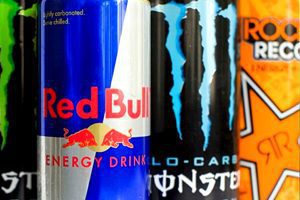
Energy Drink Contain Deadly Levels Of Caffeine. Energy drinks, including Red Bull and Rockstar, can contain potentially harmful levels of caffeine – as much as 14 cans of Coca-Cola, according to a study conducted by Johns Hopkins University. The researchers involved in the study say the drinks should carry warning labels displaying their caffeine content […]

Energy Drink Contain Deadly Levels Of Caffeine. Energy drinks, including Red Bull and Rockstar, can contain potentially harmful levels of caffeine – as much as 14 cans of Coca-Cola, according to a study conducted by Johns Hopkins University. The researchers involved in the study say the drinks should carry warning labels displaying their caffeine content and possible health risks.
A 12-ounce soft drink generally contains around 35 milligrams of caffeine, while the same size energy drink can contain as much of 500 milligrams. Unfortunately, most consumers have no idea how much caffeine is contained in any given energy drink. Most energy drinks are sold as dietary supplements, and by U.S. law, their makers do not have to submit safety evaluations to federal regulators before the products are marketed. Unlike soft drinks, the Food & Drug Administration (FDA) does not require that caffeine levels be listed on energy drinks. They are also not required by the agency to comply with the maximum caffeine content for soda and other beverages.
While the FDA has no “hard limit” on caffeine in soft drinks regulated as foods, the agency generally regards caffeine to be safe in soft drinks if it makes up 0.02 percent or less of the product, measured by weight. That translates to 71 milligrams in a 12-ounce container, according to the Johns Hopkins study.
According to the Johns Hopkins study the top selling energy drink Red Bull had 80 milligrams of caffeine per drink. Rockstar, another top seller, had 160 milligrams and No Fear had 174. Others such as Wired X505 had 505 milligrams per drink, Fixx had 500 and Cocaine Energy Drink had 280.
The large amounts of caffeine in energy drinks could be putting consumers of energy drinks at risk. Caffeine intoxication can lead to nervousness, anxiety, restlessness, insomnia, gastrointestinal upset, tremors, rapid heartbeat and overdose. The authors of the Johns Hopkins study are recommending that the drinks be regulated.
“If you are going to use a drug, you should know what it is, what it does and how to use it effectively,’’ study author Roland Griffiths, told Bloomberg.com. “If you don’t label that, you don’t know that.”
Energy drinks have been heavily marketed to teenagers and young people, and they are the biggest consumers of such drinks. The Johns Hopkins researchers cite a study that surveyed almost 500 college students and found 51 percent reported drinking at least one energy drink in the last month. Almost one-third of these students reported “weekly jolt and crash episodes” and 27 percent said they mixed alcohol with energy drinks at least once in the last month, the report said.
The personal injury attorneys at Parker Waichman LLP offer free, no-obligation case evaluations. For more information, fill out our online contact form or call 1-800-YOURLAWYER (1-800-968-7529).


